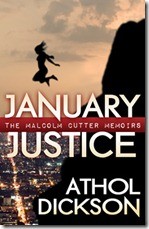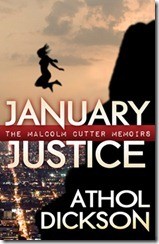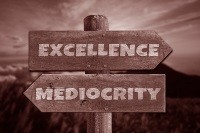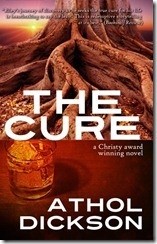 The eBook edition of January Justice is now available. Get it now at Amazon!
The eBook edition of January Justice is now available. Get it now at Amazon!
January Justice – First Pages

Here are a few paragraphs from chapter 1 of my most recent novel. I hope you enjoy…
One of the strangest things about the city was the sudden way it disappeared around the edges. One minute you were down on Sunset surrounded by glass and concrete, and the next thing you knew you were up on Mulholland, alone in the rough country. From a high window or a rooftop almost anywhere in Los Angeles you could see the mountains, and there was always a chance something hungry was up there looking down at you.
I was standing among the hungry creatures up at the edge of a cliff, with Hollywood and Santa Monica far below me in the distance. One step forward, and I would be in midair. I was looking down and wondering if Haley had considered how suddenly you could go from city to wilderness. Then I wondered if it was a distinction without a difference, if the city might be the wilderness and the wilderness the city, and maybe Los Angeles’s edges seemed to disappear so suddenly because there really were no edges, no difference between sidewalks and mountain paths, buildings and boulders. Up in the mountains or down in the city, either way the carnivores were in control.
I imagined Haley, out of her mind, running full speed off the cliff. I wondered what it had been like, that final second or two before she hit. Had she realized what was happening? Did she recognize the city lights below for what they were, or did she really think she was flying toward the stars? And did she think of me?
Stepping closer to the edge, I slid the toes of my shoes into the air. I looked down two hundred feet, toward the spot where she had broken on the rocks. I stood one inch from eternity and tried to imagine life without her. I could not summon up a single reason why I should not take that final step, except for one. I thought about the kind of animal that would drive someone to do what my wife had done. Predators like that were everywhere. I should know. I had trained for half my life to be one of them. I was hungry, looking down on the city. If I was going to live, the hunger would have to be enough, for now. I would sink my teeth into him, sooner or later. I would do that for Haley, and for myself, and then maybe it would be time to see if I could fly.
I stepped back from the edge.
A Duty to Be Great
 There’s a list over at over at GoodReads, called “The Worst Books of All Time.” As a novelist and as a Christian, that list saddens me. Why? Because some of those titles include To Kill a Mockingbird, Billy Budd, The Red Badge of Courage, Tess of the D’Urbervilles, Forest Gump, Fahrenheit 451, Dune, Stranger in a Strange Land, and The Pearl.
There’s a list over at over at GoodReads, called “The Worst Books of All Time.” As a novelist and as a Christian, that list saddens me. Why? Because some of those titles include To Kill a Mockingbird, Billy Budd, The Red Badge of Courage, Tess of the D’Urbervilles, Forest Gump, Fahrenheit 451, Dune, Stranger in a Strange Land, and The Pearl.
While discussing it with some fellow novelists, one said many books by Christians are poorly written. She then felt the need to qualify her statement by affirming that she thinks there are lots of well-written novels by Christians. Probably she didn’t want to hurt anybody’s feelings, and that’s laudable, but it seems to me she had it right the first time.
It’s true many novels by Christians are poorly written. That’s also true of many other kinds of novels. In fact it’s true of most novels of every kind, and readers let writers get away with it because readers too are mediocre. Most of us don’t really care about excellence in literature, or in architecture, sculpture, painting, dance, drama, government, commerce, marriage, or anything else in life that ought to matter. The list at GoodReads is just one of countless proofs of this which can be seen around us everywhere.
What interests me, is why. In our discussion about the “Worst Books” list, some of my author friends speculated that so many people dislike those novels because they were forced to read them in school and disliked them then. But these books truly are works of genius—most of them are, anyway—so why didn’t we love them in the first place?
The answer has to do with what it means to live in a fallen world. As creatures made in the Creator’s image, we were designed to use our gifts to their utmost, and to savor excellence in our neighbor’s use of their gifts. It’s impossible to imagine the words “good enough” being spoken in the Garden before the Fall. But we did fall, and one of the things we lost was our ability to throw ourselves into living with complete abandon. “Good is the enemy of great,” as Jim Collins wrote (paraphrasing Voltaire). Thus, in settling for good enough, we have rampant mediocrity in the world.
It’s impossible to imagine the words “good enough” being spoken in the Garden before the Fall.
Another thing we abandoned in the Fall was our ability to perceive the true extent of what we’ve lost. When expediency and ego dilute the full potential of even our best writers and artists, the audience, being also lost, doesn’t know enough to care. Therefore they applaud what little they can get, and their applause rewards mediocrity. This in turn inspires the production of more mediocrity, and the cycle builds more and more support for itself until mediocrity seems normal, or even (God forbid) good. Because that lie has become pervasive, the true nature of goodness is difficult for even Christians to remember. Thus we have rampant mediocrity even in the church.
The faithful Christian’s life should always include a sense of resisting mediocrity at every turn. It’s a command and a duty. “Whatever you do, do it will all your heart, as if for the Lord and not for men.” (Col 3:23) It’s no coincidence that this command includes the same requirement for wholeheartedness as the Greatest Command of all, to “love the Lord your God with all your heart….”
How can we love the Lord with all our heart? By living every part of life with all our heart. By not settling. By always striving to improve. In other words, as with all of His commands, the Creator simply wants us to live (write, marry, work, etc.) as we were originally created to live…with complete abandonment to what we truly are, which will reveal itself in the constant exercise of excellence in all our gifts.
Don’t believe the lie of “good enough.” You were created to be so much better than that. Strive for excellence in everything you do. In little things as well as big, live with all your heart.
A Review of The Cure

It’s gratifying when readers take the time to review one of my books. Here’s a review posted at Amazon by Claudette Wood.
She dropped the envelope in the offering plate. The note inside it read, “May the Lord forgive me, I should have done this long ago. Whoever opens this, please give it to the pastor. He’ll know what to do. Tell him it will cure alcoholics, and I want everyone to have it. Tell him if they ever drink again, the urge will return stronger than ever. I used to think there was a way to fix that too, but now I know there isn’t. Anyway, this will cure them so long as they never drink another drop.”
A rumor that someone in his hometown has discovered the cure for alcoholism brings Riley Keep back to the place of his past. Hoping to find cash to buy alcohol in an envelope stolen from a church’s offering plate, Riley instead discovers a small amount of the cure–along with the formula for the cure. He views the discovery as a Godsend; yet what happens after his cure is anything but a blessing. Riley makes an effort to right the wrongs he has committed–some real and some a product of a terrible lie he’s accepted as truth. No matter what he does, though, nothing works out for the good, with the result being a town destroyed by desperate people hoping for an instant cure; a seriously wounded wife; and a hunted woman murdered for what she knows, and Riley accused of her murder.
Upon learning of his teenage daughter, Bree’s, pregnancy, Riley offers to take care of her by buying her a house, a car, everything she will ever need–all from the money he earned by selling a stolen formula to a (dishonest) corporation. Her answer to him is no.
She tells him, “I think sometimes the right thing is the wrong thing. I made a bad mistake. I need to live with this, you know? Not take the easy way out this time. I think that’s how God shows you the way to be a person.”
The time you spend reading The Cure will be time well spent. It speaks to alcohol addiction, but is relevant to all addiction. There is no fairy-tale ending here. Real life isn’t that way (it’s only one of the things I admire about Athol Dickson’s ability to tell a story). This is a story of failure, as we are reminded by Riley’s example we can’t do it all by ourselves. It is also a story of faithfulness, shown by the commitment of an abandoned wife who keeps her vows to a man through the worst part of “for better or worse.” Most important, it’s a story of redemption, as we are reminded that God never leaves us, no matter how deep we live in our sins.